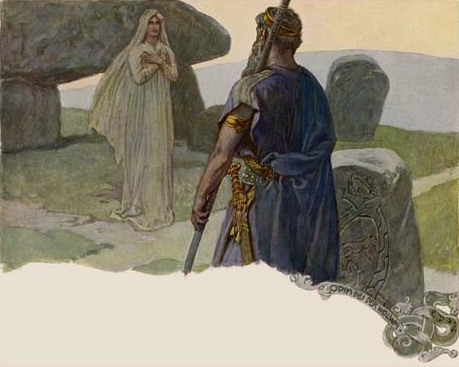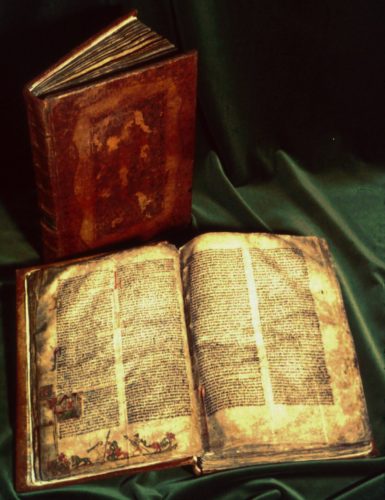![]() In late June, Jade Pichette started the #HavamalWitches hashtag on Facebook. Her explanatory post referenced the Old Norse poem Hávamál (“Sayings of the High One”) and was addressed to women who practice Ásatrú and Heathenry, modern iterations of Germanic polytheism. She called upon her audience to share their experiences of sexism within their religious communities:
In late June, Jade Pichette started the #HavamalWitches hashtag on Facebook. Her explanatory post referenced the Old Norse poem Hávamál (“Sayings of the High One”) and was addressed to women who practice Ásatrú and Heathenry, modern iterations of Germanic polytheism. She called upon her audience to share their experiences of sexism within their religious communities:
So a hashtag #HavamalWitches has started to critique sexism in the Heathen community. Overall the women and femmes in the Heathen community have put up with a lot of sexism and this is basically us letting off steam and making transparent what we experience. It references the fact in the Havamal there are some really sexist stanzas so we are the Witches the Havamal warns you about. If you have posts to make please do, and if you are comfortable feel free to do so publicly.
As so often happens, the hashtag was quickly hijacked by straight white men who questioned the women’s knowledge of poetry, mythology, and history; who challenged the veracity of their testimonials of personal experience; who denied that misogyny and sexism exist within their own communities; and/or who insisted that men are the ones who are really discriminated against.
Of course, #NotAllMen acted like this. Some jumped in to support the women and argue with the trollish types. I followed one long Facebook thread that was completely swamped by men fighting each other. Despite the good intentions of the anti-troll brigade, the fact remains that men on both sides took over a hashtag asking women to share their experiences with sexism.

Man vs. Woman, Clauss Pflieger, 1459 [public domain].
Recently, men’s rights activist types were furious when the Alamo Drafthouse in Austin announced women-only screenings of the new Wonder Woman film “for one special night.” As with the #HavamalWitches thread, the nastiness of the reaction proved exactly the point being made – in this case, that women just maybe might enjoy one single evening of their lives celebrating and enjoying a female hero for a couple of hours without a chorus of condescension from male companions. For the men’s online chorus, this was absolutely and utterly unacceptable.
Earlier this week, the announcement by the BBC that Jodie Whittaker will be the thirteenth actor to play the lead role on Doctor Who (not counting John Hurt and other special cases) caused such a flurry of fury from men with opinions about women that some people began playing “13th Doctor Casting Comments Bingo,” collecting the completely predictable predictions of disaster and outraged declarations of wounded male pride that flooded social media.
Ásatrú and Heathenry have long struggled with a very vocal minority of practitioners who espouse racist beliefs. There is an incredibly strong stance in the mainstream of the religious communities against such extremism. Sexism, however, is a more insidious force. Heathen women have shared their experiences with sexist attitudes, behaviors, and statements even in organizations that are outspoken on issues of inclusion.
“On a Whirling Wheel”
When faced with divisive issues, Heathens often turn to their hoard of inherited mythology, poetry, saga, and historical accounts, supplemented by academic works both fresh and dusty. What insights into sexism, misogyny, and the social roles of women can we gain from such a turn to the past?
Hávamál, the medieval Icelandic poem cited in the #HavamalWitches hashtag, purports to be in the voice of Odin. It does have some strikingly sexist stanzas:
84. A maiden’s words must no man trust,
nor what a woman says,
for on a whirling wheel
were hearts fashioned for them
and fickleness fixed in their breast.90. So the loving of women –
those who think in lies –
is just like driving a horse smooth-shod
over skidding ice
– a lively two-year-old,
and badly trained –
or in a mad wind maneuvering a rudderless boat –
or like a lame man having to reach
a reindeer on a thawing hillside on skis.
The poem’s presentation of gender roles isn’t all one way, however. The speaker is also critical of male behavior towards women:
91. I now state a bare fact
– for I know both sexes –
men’s devotion to women is not dependable.
We speak fairest words
when we foster slyest thoughts –
that deceives a delicate mind.
This multivalence of views also appears elsewhere in the Poetic Edda, the collection of Icelandic poems largely found in the Codex Regius (“Royal Book”) manuscript of c. 1270 that includes Hávamál.
In Lokasenna (“Loki’s Quarrel”), many of the goddesses speak out against the belligerently sexist verbal assaults of Loki. Nearly as many women as men speak in the poem, and their responses are equally proud and powerful.
In Völuspá (“Prophecy of the Seeress”), it is a female voice (or set of voices) that speaks of what has been, is, and will be. The audience is all of humankind – “the offspring of Heimdall” – and even the wisdom-drinking patriarch Odin himself must bring gifts and plead with the wise woman to share some of her vast store of knowledge.

The Seeress and Odin, Emil Doepler, 1905 [public domain].
35. Hrímgrímnir [“Frost-Masked”] the ogre is called
who will have you
down below the corpse pens:
let serfs there
at the tree’s roots
serve you goats’ urine.
Grander drink
you will never get,
girl – to meet your wishes,
girl – to meet my wishes!
In Hárbarðsljóð (“Song of Graybeard”), the one thing that the quarreling Thor and Odin (in disguise as Harbard, “Graybeard”) agree upon is how enjoyable it would be to commit rape together:
Thor: You had good dealings with the girl there.
Harbard: I could have done with your help, Thor,
to hold the linen-white girl.Thor: I’d have helped you with that, if I could have managed it.
Harbard: I’d have trusted you then, if you didn’t betray my trust.
The same balance between inspiring portrayals of powerful women and sickening celebrations of sexual assault appear in prose sources. For every brave heroine, there is a violated victim of violence.
On one hand, there are the strong women of the Icelandic sagas such as the poet Steinvora. She confronts the Saxon missionary Thangbrand, proudly preaches paganism to him, boasts that Christ was afraid to accept Thor’s challenge of single combat, and sings verses gloating that her god demolished the priest’s ship.
On the other hand, there are reports of extremely violent sexual assault. The Arab chronicler Ibn Fạdlān tells the grisly tale of a slave girl who, after she is “befuddled” with alcohol, is raped by six men before being stabbed and strangled to death beside the decaying corpse of her dead master.
“A Decay of Her Honour”
Perhaps it is time for today’s Heathens to embrace the fact that they are part of a new religious movement (NRM) founded 45 years ago. Whatever subset of Heathenry practitioners practice, the beginnings of their praxis date to the first meeting of what would become the Ásatrúarfélagið (“Ásatrú Fellowship”) at the Hotel Borg in Reykjavík on April 20, 1972.
Although historical heathenry has roots that go back 4,000 years to shadowy origins in the Bronze Age of Northern Europe, modern practice follows in the footsteps of that fateful day when a dozen visionaries gathered in Iceland to revive the old way. What that small group began has now grown into a cluster of religions found in nearly 100 countries.
Despite declarations and denials from various subsets of Heathenry, these are not ancient religions that are practiced today but rather a set of overlapping new religious movements that revive, reconstruct, and reimagine ancient Germanic polytheism using elements gathered from a great variety of sources on long-ago beliefs and practices. We study and learn as much as we possibly can about the olden times, but we cannot escape the fact that we are citizens of modern nation-states who live in the twenty-first century and self-consciously practice post-1972 traditions.
As members of modern religions, we are not bound by holy writ. The poems of medieval Iceland are intense and inspiring, but they are not divine commandments of belief and behavior. They are religio-cultural products of a specific segment of a specific population at a specific time in a specific location, and they reflect the assumptions and prejudices of those people then and there.

Codex Regius stands behind Flateyjarbók (“Flat Island Book”) [public domain].
This diversity of views can also be found in professional scholarship. For every Jenny Jochens carefully parsing medieval sagas and law codes for evidence of women’s roles in Old Norse society, there is a Vilhelm Grønbech celebrating the honorable “Germanic standard” of killing one’s own daughter for having sex outside of marriage, in order to save the family from “the danger arising from a decay of her honour.” Like all of us, academics allow their own worldviews to shape their views of the past, and the result is a set of widely divergent analyses of the same materials.
Commitment to Community
If ancient sources and modern academia alike present us with conflicting ideas about women’s roles and rights, maybe we should simply recognize that views of gender and sexuality are — like those of race and ethnicity — changeable concepts that evolve over time.
We are modern people with access to amounts of information that were unimaginable even a decade or two ago. There is nothing to prevent us from being mindful members of society rather than slavish historical re-enactors.
We shouldn’t need to recite poetic verses or cite academic sources to convince men that women are people. We should all respect women as individuals and honor their input, because they are human beings with identities and agency. Period. This shouldn’t need to be spelled out, but it apparently must.

Frey (“Lord”) and Freya (“Lady”) by Donn P. Crane,1920 [public domain].
Maybe it is beyond the emotional capacity of some men today to accept that everything isn’t for them. As time goes on, these men will become increasingly marginalized as relics of a bygone era. Hopefully, they will at least find the self-restraint to refrain from committing the violent acts that they so often threaten online.
This isn’t a Heathen problem, necessarily, but it plagues Heathen communities as it does so many others. If we are proud of our commitment to community – and many of us are – let’s lead the way and work towards making our communities positive models of respectful behavior.
Sources used for this article include The Culture of the Teutons (Grønbech, trans. Worster), “Ibn Fạdlān and the Rūsiyyah” (Montgomery), The Poetic Edda (trans. Dronke, Larrington), The Story of Burnt Njal (trans. Dasent).
* * *
The views and opinions expressed by our diverse panel of columnists and guest writers represent the many diverging perspectives held within the global Pagan, Heathen and polytheist communities, but do not necessarily reflect the views of The Wild Hunt Inc. or its management.
The Wild Hunt is not responsible for links to external content.
To join a conversation on this post:
Visit our The Wild Hunt subreddit! Point your favorite browser to https://www.reddit.com/r/The_Wild_Hunt_News/, then click “JOIN”. Make sure to click the bell, too, to be notified of new articles posted to our subreddit.